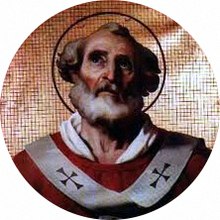Pope Hormisdas
|
Pope Saint Hormisdas |
|
|---|---|
 |
|
| Papacy began | 20 July 514 |
| Papacy ended | 6 August 523 |
| Predecessor | Symmachus |
| Successor | John I |
| Personal details | |
| Birth name | Hormisdas |
| Born | 450 Frosinone, Campagna di Roma, Italy |
| Died | 6 August 523 Rome, Italy |
| Sainthood | |
| Feast day | 6 August |
|
Papal styles of Pope Hormisdas |
|
|---|---|
 |
|
| Reference style | His Holiness |
| Spoken style | Your Holiness |
| Religious style | Holy Father |
| Posthumous style | Saint |
Pope Hormisdas (450 – 6 August 523) was Pope from 20 July 514 to his death in 523. His papacy was dominated by the Acacian schism, started in 484 by Acacius of Constantinople's efforts to placate the Monophysites. His efforts to resolve this schism were successful, and on 28 March 519, the reunion between Constantinople and Rome was ratified in the cathedral of Constantinople before a large crowd.
Jeffrey Richards explains Hormisdas' Persian name as probably in honour of an exiled Persian noble, Hormizd, "celebrated in the Roman martyrology (8 August) but not so honoured in the East." The names of his father and son suggest he had an otherwise "straightforward Italian pedigree." However, according to Iranica he was probably related to Hormizd.
He was born at Frosinone, Campagna di Roma, Italy. Before becoming a Roman deacon, Hormisdas was married, and his son would in turn become Pope under the name of Silverius. During the Laurentian schism, Hormisdas was one of the most prominent clerical partisans of Pope Symmachus. He was notary at the synod held at St. Peter's in 502. Two letters of Magnus Felix Ennodius, bishop of Pavia, survive addressed to him, written when the latter tried to regain horses and money he had lent the Pope.
Unlike his predecessor Symmachus, his election lacked any notable controversies. Upon becoming Pope, one of Hormisdas' first actions was to remove the last vestiges of the schism in Rome, receiving back into the Church those adherents of the Laurentian party who had not already been reconciled. "The schism had lingered on largely out of personal hatred to Symmachus," writes Jeffrey Richards, "something with which Hormisdas was apparently not tainted."
...
Wikipedia
